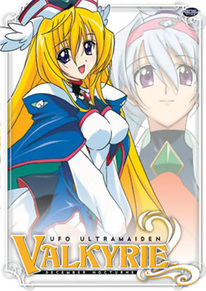Review
by Carl Kimlinger,UFO Princess Valkyrie 2
DVD 3 - Toast That Ghost
| Synopsis: |  |
||
When it turns out that Akina and Hydra—when their friendship breaks down—can combine to form a superbeing called Akidra, their prickly relationship may be the only way to save Kazuto from the predatory Valkyrie Ghost. Especially when she kidnaps the hapless bathhouse-owner and unleashes a hellish space-time storm on Valhalla, leaving a devastated Valkyrie behind. The remaining princesses—Hydra, Valkyrie, regal Mehm, shape-shifting Laine, and introverted otaku Chorus—head home to save their homeland with the help of their bathhouse comrades. Even if they do manage to unravel the mystery of the Ghost, what can four princesses, a young student, one shrine maiden and three diminutive—if battle-hardened—aliens hope to do against a space-time storm? |
|||
| Review: | |||
It seems that those optimistic souls who make "it gets better later" claims for UFO Ultramaiden Valkyrie are suffering from some confusion as to the difference between the words "more serious" and "better," namely the fact that the two aren't necessarily one and the same. In the case of Valkyrie, seriousness isn't positive or even neutral, but negative. Valkyrie's only appeal has always been its easygoing nature. Even when being frantically hyperactive, it was always strangely under-played and tension-free, even relaxing. Which is a (very) nice way of saying that the series is so predictable, so determined to maintain the status quo, that it becomes a kind of comfort-food; an oasis of mediocrity in which one doesn't have to worry about nasty things like plot twists, unexpected character developments, changing circumstances, or intruding reality. As such, this season's attempt to create tension and emotion is actually counterproductive, as it effectively eliminates the first season's only redeeming quality. This wouldn't be such an issue if the drama were successful, but the paper-thin characters are utterly incapable of eliciting any emotional response. To make things worse, Chorus is so hideously annoying that she could single-handedly destroy a good show (what she does to a mediocre show is simply unspeakable), the humor involving Spot and his cute-but-deadly comrades has finally worn thin enough to see through, and the addition of Akidra is little more than a convenient plot device and a source for gags that are promptly flogged to death by overuse. Which leaves a sparse harvest of successful jokes, an (un)healthy amount of jiggling, and the creepiness of watching a five-year-old girl sprouting breasts and buttocks. Yay. Anyone who has seen the first season knows exactly what to expect from this title artistically: a focus on costuming (especially the various princesses), some surprisingly detailed and atmospheric backgrounds, and pretty yet unremarkable character designs with occasionally inconsistent body proportions. Animation is basic cheap anime: action conveyed via stills, with backgrounds that go MIA whenever things get too active, and enough repeated animation to make Sailor Moon blush—the Akidra transformation is repeated thrice in one episode, accounting for fully 10% of that episode's animation. Veteran anime composer Kenji Kawai's score for Valkyrie is a lesson in the effects of quality feedback between content and formal elements. In any other show, it might well have been a quality score, but in Valkyrie only the fluffy compositions (and their correspondingly fluffy content) are successful, while the dramatic and action compositions feel as if they're trying too hard. The opening song is in exactly the same style as the first season's, and while peppy and reasonably pleasant, seems like a sad waste of the late Ritsuko Okazaki's prodigious talents. The closer is so forgettable that descriptive words don't have time to form before the brain completely purges it from the short-term memory. The Japanese and English versions each have their own advantages and drawbacks. Chorus is far more tolerable (though not entirely so) in the English version and Kira Vincent-Davis' Big Valkyrie doesn't have the strained quality that sometimes taints seiyuu Megumi Ogata's rendition. On the other hand, Spot's buddy Marduk sounds like he accidentally swallowed Daffy Duck, Kazuto's sister Rika sounds like she's channeling Velma from Scooby-Doo, and Vincent-Davis makes a less than convincing young child. But ultimately, the talent on both sides of the Pacific succumb to the same dreadful enemy: the show's script—which, by the way, the dub is quite faithful to. So pick your poison and go. If the extras—text interviews with various staff members and the ever-present "World Notes" by original authors Kaishaku—are any indication, then this show must have been a lot more fun to make than it is to watch, as they seem rather inordinately fond of their end-product. There're also three more videos for songs by the Japanese voice talent and more notes on the various cultural references in the show. In many ways, it seems as if Kaishaku's popular Steel Angel Kurumi got split between their later works, with Kannazuki no Miko getting all of the emotional content, character depth (what precious little there was), focus, and narrative daring, while Valkyrie got the puerile obsession with bouncing busts, silly humor, harem mentality, and squealing girls. It's hardly a fair exchange, but just when it seems there's no reason to drag butt through yet another season (yes there's a third season) Kaishaku casually mentions this line from the production plan for the third season: "in space it's perfectly OK for two women to get married" and (damn my hormones!) I'm in for the third season too. |
| Grade: | |||
|
Overall (dub) : C-
Overall (sub) : C-
Story : D
Animation : C
Art : C+
Music : C+
+ The Akidra transformation is kinda funny—at least the first couple of times. |
|||
| discuss this in the forum (2 posts) | | |||
| Production Info: | ||
|
Full encyclopedia details about Release information about |
||